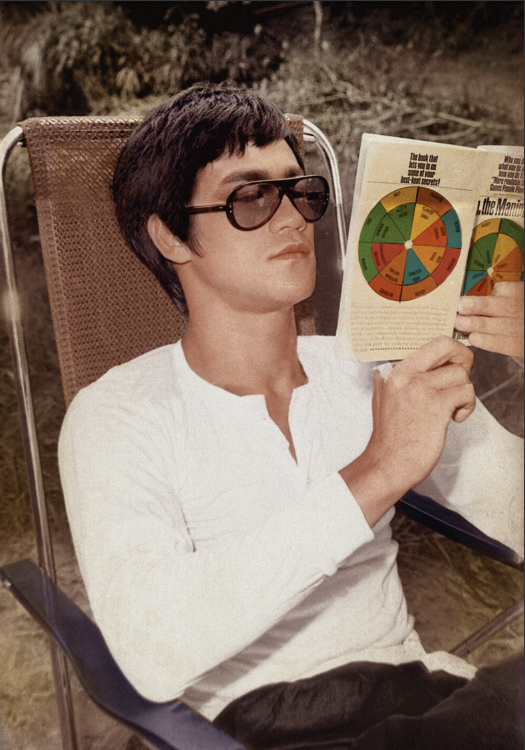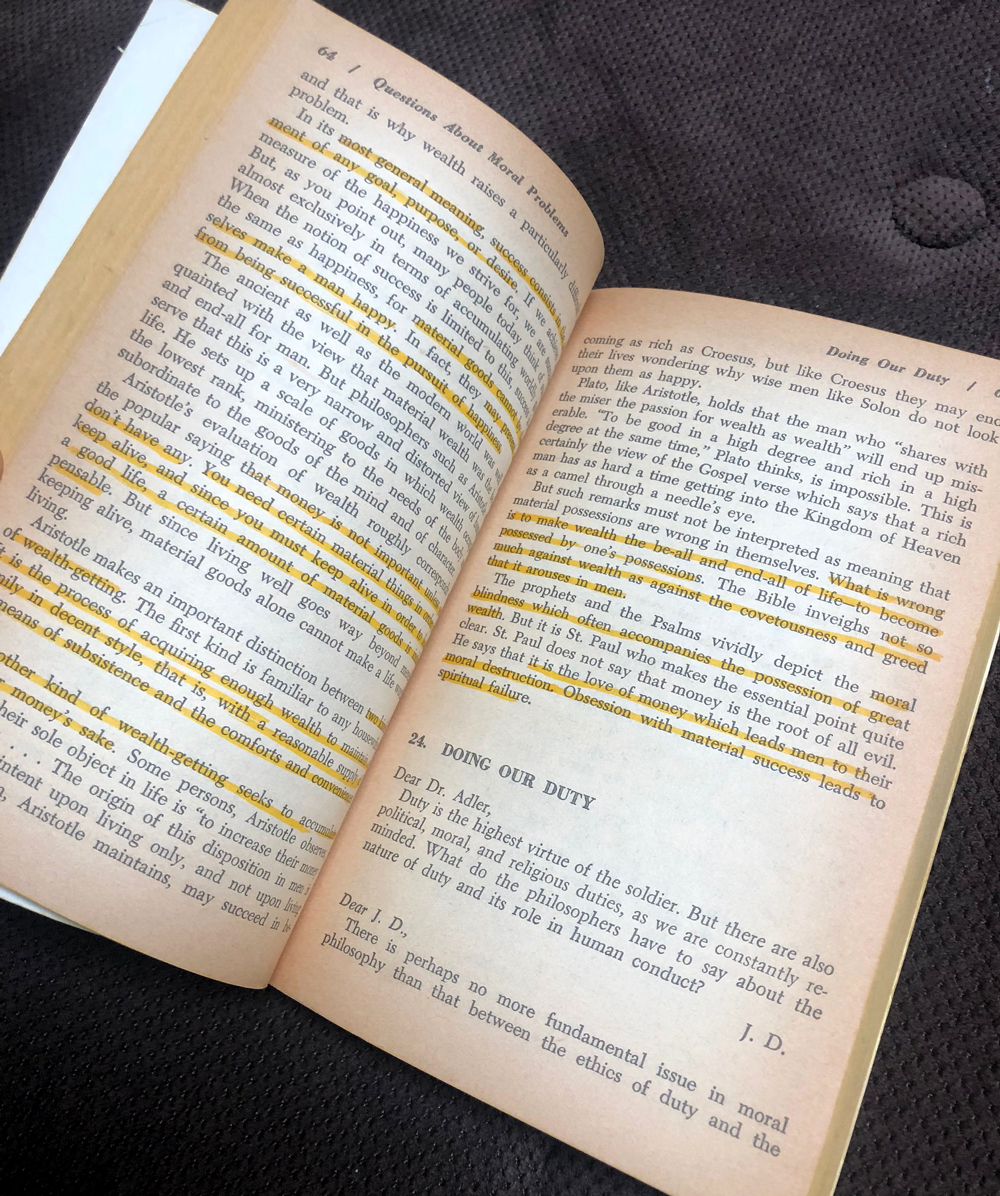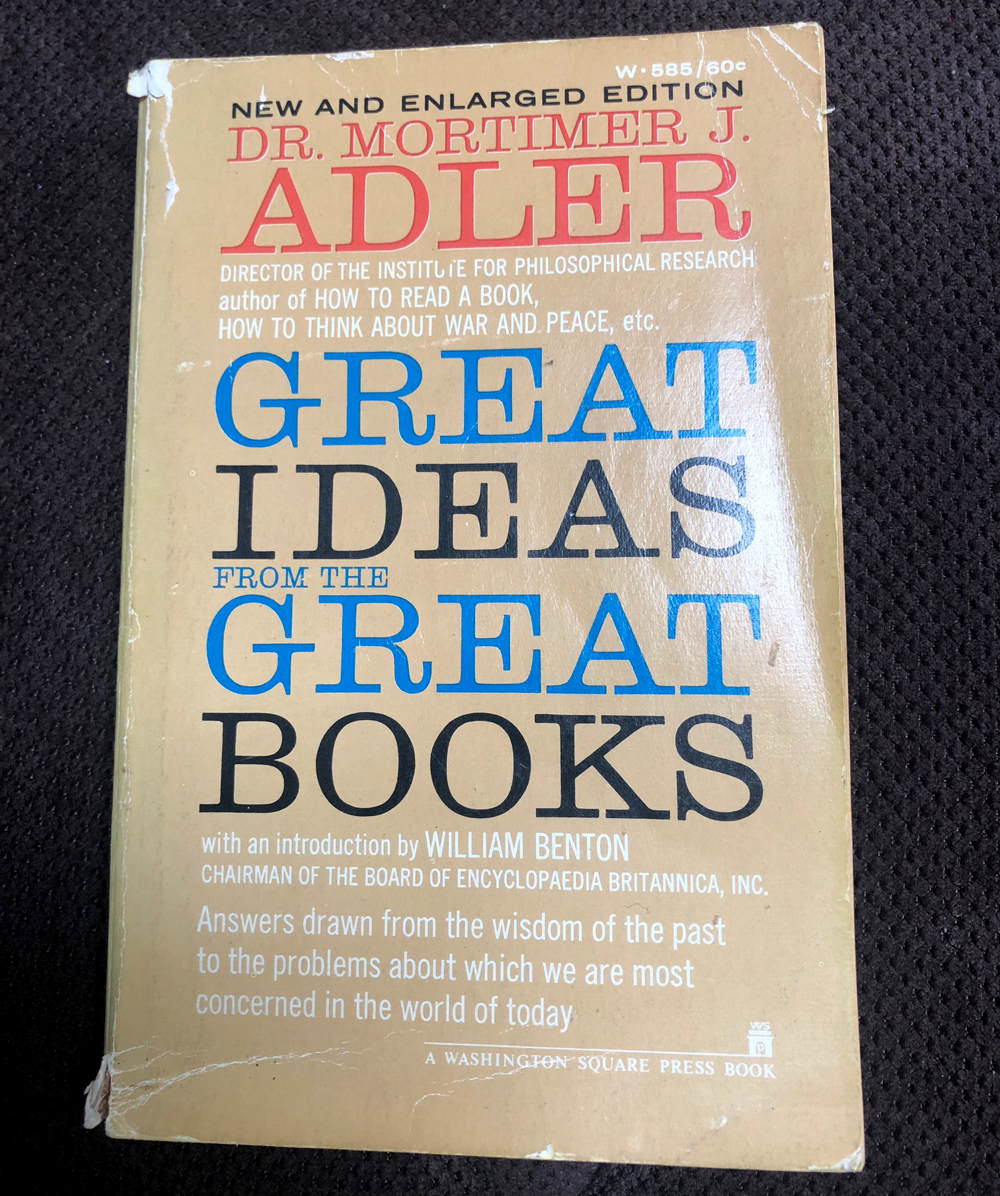#121 Bruce Lee Library: Great Ideas from the Great Books
Bruce Lee had a giant library and read voraciously. He would annotate his books, and it’s evident that these books helped influence his philosophies and approach to living life. We think it’s important to share these books because they help illuminate the process of Bruce Lee becoming himself and how he used the insights gained from his reading and molded them to fit himself.
In this episode we return to the Bruce Lee Library to discuss his annotations of the book, Great Ideas from the Great Books by Dr. Mortimer J. Adler, Director for Philosophical Research, Answers drawn from the wisdom of the past to the problems about which we are most concerned in the world today.
Bruce Lee was a philosophy major in college, so it makes sense that he was in exploration of all the great philosophers in the world. He had a wonderful harmony of Eastern philosophy and Western philosophy.
This book is broken up by topic. For each topic, the author has gone through and found what the most famous Western philosophers have said on these topics. Dr. Adler has boiled down these ideas to be digestible philosophical nuggets for the reader offering a tour of Western philosophy.
This book is underlined in two different colors, red and blue. Shannon thinks that the red indicates ideas Bruce Lee particularly liked. Bruce used a ruler to underline or used a squiggly line.
The first section in the book is: Questions About Philosophy, Science, and Religion
Bruce underlined: “The reason we read the great books – of literature, science, or philosophy – is to deepen and broaden our intelligence and imagination, not to acquire up-to-date information.”
From the section: On the Use of Free Time
“As for play or amusement, like sleep, it has biological utility. It provides relaxation and refreshment; it washes away the fatigues and tensions caused by work.” –Aristotle
Here Aristotle is saying that play is necessary, it provides a salve to our weariness. Bruce Lee believed in the importance of play and laughter as well. Even though Bruce is often thought of as a serious person, he was very much a goofball.
“Since earning a living is for the sake of being able to live well or lead a good life, then business or toil is for the sake of leisure. Business or toil is necessary but it does not enrich or enoble a human life. Leisure, in contrast, consists in all those activities by which a man grows morally, intellectually, and spiritually. It is that which makes the life worth living.” -Aristotle
This concept is reflected in Bruce Lee’s definite chief aim. Bruce describes how he wants to be the highest paid Asian actor and martial artist, and earn $10million, but at the end states that all of those goals are to achieve a peaceful and harmonious life.
From the section: Questions About Philosophy, Science, and Religion
Bruce Lee was very scientifically minded, he believed in experimenting and testing different things to see what worked best for him.
“…the moral utility of philosophy derives from its profound understanding of the ultimate realities that underlie the phenomena which science studies.”
“(Certainly it should be clear that the more science we possess, the more we need philosophy, because) the more power we have, the more we need direction.”
Both science and philosophy explore the questions surrounding life. Before modern science came about, it was philosophers who pondered the wonders of nature and the universe.
From Section: Questions About Moral Problems
“Happiness is not something you can feel or experience at a particular moment. It is the quality of a whole life. The happy life is the good life.”
“(…most people would say that children can be happy. They) can be gay or joyful but not happy because they have not lived a compete life.”
In the margins next to this quote Bruce wrote, “Happiness IS!”
This quote describes a happiness, a contentment, that is in the whole process of life.
From Section: On Success
“What is wrong is to make wealth the be-all and end-all of life – to become possessed by one’s possessions. To be not against wealth but against the covetousness and greed it arouses in men. It is the love of money that leads men to their moral destruction. Obsession with material success leads to spiritual failure.”
It is evident looking through this book how Bruce Lee took these philosophies and applied them. Even with his affirmations, which he carried around with him, were segmented into philosophical categories similar to how this book is segmented.
Bruce’s instinct was to take something he had learned and test it out. Many of us only think about ideas instead of testing them out.
From the section On Duty:
“Duty is objective. It is independent of subjective inclinations. In doing our duty, we follow the voice of reason alone.”
On Conscience:
“(Conscience forbids us to lie to ourselves or to do harm to ourselves and others.) We have “internal” as well as “external” obligations.”
On Virtues:
“It is much easier to train the mind than form the character.”
On Conflict between reason and emotion:
Bruce highlighted this quote with an exclamation point in the margin:
“The great writers express three main views –
1) reason should govern emotion
2) reason should get rid of emotion
3) emotion should rule over reason”
Bruce wrote in the book about reason and emotion:
“Each is the cause and result of the other – reason is emotion, emotion is reason – why wrestle? Flow with it as a whole.” – Bruce Lee
On Teaching:
“It is the learner, not the teacher, who is the active producer of knowledge and ideas.”
“The teacher does not impose a fixed content of ideas and doctrines, that the student must learn by rote. He teaches the student how to learn and think for himself.”
It’s evident in Bruce’s own writings on teaching and creating his own way, that these underlined philosophies were something that he internalized and applied.
On Love:
“The deepest need of man is the need to overcome his separateness, to leave the prison of his aloneness.”
Bruce often wrote about joining with the oneness and not staying in isolation. He was a very social man who loved talking with and meeting new people. Even in his alone time, he was training, meditating, reading, but he was always processing and untethering to be in communion with the Oneness.
On Beauty:
“The word “seen” does not refer to seeing with the eyes. It refers to vision with the mind – a kind of intuitive apprehension of the object which is being contemplated.”
When we look beyond the visual representation of an object or person, and look with an intuitive sense, feeling into whatever we are trying to perceive, then we establish an unspoken connection with what we are looking at.
On Friendship:
“The essence of friendship is reciprocity: giving and getting something like what you give.”
This is not about keeping score in a relationship; it is about a flow of energy back and forth. If one side is giving more than the other, it is unharmonious. Examining how we feel in a relationship gives us a lot of information about the relationship. Do we feel drained after being around someone? Rejuvenated? Inspired? It is good to practice examining our relationships.
On the Purpose of Life:
“Men must find meaning in the creation and transformation of their own nature. A man who is truly human must live for some transcendent goal that he sets himself. If he does not do this, he must be engulfed in overwhelming despair at the meaningless of life.”
This ties in directly with Bruce Lee’s philosophy around knowing oneself, cultivating oneself, expressing oneself, and reaching for one’s potential.
When we don’t make the effort to tap into our true essence, and understand it, we lack meaning because we don’t know ourselves, and can’t connect to our true purpose in life. Our true purpose is to create who we are and to be our true self.
Write to us at hello@brucelee.com or tag us @brucelee on social media with #bruceleepodcast.




